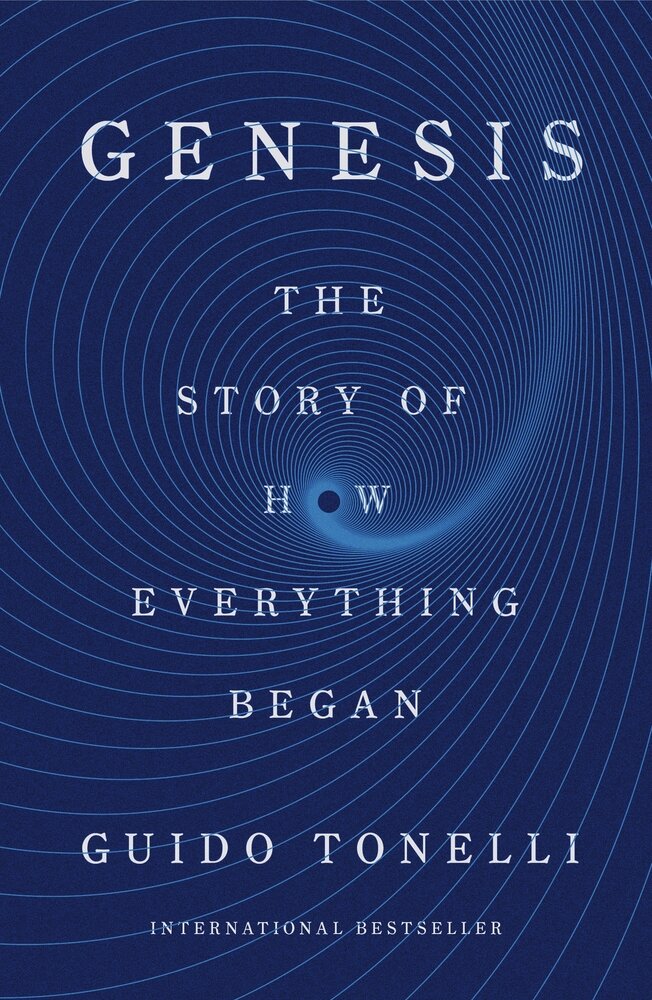Genesis by Guido Tonelli
/Genesis: The Story of How Everything Began
By Guido Tonelli (translated by Erica Segre & Simon Carnell)
Farrar, Straus and Giroux, 2021
Genesi, by Guido Tonelli, Italian particle physicist and one of the discoverers of the Higgs boson, first appeared in 2019, only a few years after Tonelli and a handful of others had provided to an uncomprehending world evidence that this elementary particle from the very birth of the universe was still loitering around, waiting for somebody to call it by name. And now, a few years later, the book appears in as Genesis: The Story of How Everything Began in an English-language translation by Erica Segre and Simon Carnell. And the book’s remit is unavoidable: anybody concerned with the Higgs boson is necessarily concerned with beginnings. Tonelli writes about the start of the universe.
Virtually the entire duration of the theoretical events described in these 200 pages took place in far, far less time than it takes you to blink once while reading about them. Tonelli is mostly writing about the first picoseconds of the universe, long, long before the “ancient, cold universe that we inhabit,” when everything was light and unimaginable heat and primordial explosion. It was in that furious newborn universe that the Higgs boson was born and thrived, and, predictably and wonderfully, Tonelli captures the bizarre sequel quite well:
The newborn universe is already pretty imposing. It has reached the not inconsiderable dimension of a billion kilometres. Suddenly, when the temperature decreases below a certain threshold, the Higgs bosons which until a moment ago had been roaming freely, now begin to congeal and crystallise. At these temperatures, which are freezing for them, they are unable to survive and are hidden away in the comfortable sepulchre of the void. It will require a great deal of patience before they are seen again. It will take 13.8 billion years in fact, before on planet Earth someone will manage to engineer collisions of energy of such magnitude as to bring them back to life, if only for a fraction of a second.
Tonelli knows his way around particle accelerators like the Large Hadron Collider underground near Geneva, “a modern apparatus for high-energy physics is as tall as a five-storey building, weighs as much as a cruise ship, and contains tens of millions of detectors,” as he describes it, a bafflingly complex device that’s vulnerable to a whole host of possible failures: “an overlooked minor detail, a defective chip, a fragile connection, a cooling tube that has been hastily soldered,” and so on. Tonelli’s descriptions of what amounts to his workplace are disappointingly fleeting in these pages; even the lay reader will be able to glean that the discovery of the Higgs boson is a major scientific event worthy of a long, detailed chronicle of its own.
This isn’t that book. Instead, Tonelli maps those picoseconds of the universe’s birth onto, as the title suggests, the creation account in the Book of Genesis. The rationale behind this is impenetrable and maddening; there is no connection whatsoever between the three-thousand-year-old mythology of primitive tribesmen and the science of cosmology and particle physics, and any attempt to invoke one - especially by a scientist, for the love of Mike - is only counterproductively encouraging to the science-denying religious fundamentalists who already have way, way too much encouragement in the 21st century.
The organizing conceit aside, however, Tonelli’s book is such a lively introduction to the current theorizing about the first 10-to-the-negative-30th seconds goings-on in the universe that you might actually find yourself understanding some of it. Talk about something out of nothing.
Steve Donoghue is a founding editor of Open Letters Monthly. His book criticism has appeared in The Boston Globe, The Wall Street Journal, The Washington Post, and The American Conservative. He writes regularly for The National, The Vineyard Gazette, and The Christian Science Monitor. His website is http://www.stevedonoghue.com.
